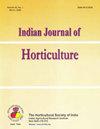Effect of transplanting dates, cultivars and zinc on yield and economics of onion in semi-arid conditions in Rajasthan
Q4 Agricultural and Biological Sciences
引用次数: 0
Abstract
Delayed transplanting and insufficient nutrient application are the major factors responsible for reducedonion yield. Proper planting time is critical for getting optimal bulb yield. Selection of right cultivar is one of themost important variables in getting higher growth and yield attributes for a particular agro-climatic condition. Anexperiment was conducted to determine the effect of transplanting date, cultivar and zinc application method onyield, yield attributes and economics of onion. Results were found to be significant for all the yield attributes,yield and economics of onion. Transplanting on 01st January significantly increased the average bulb weight(81.10 g), equatorial diameter (5.58 cm), polar diameter (4.52 cm), total bulb yield (387.42 q/ha), net return (Rs367963/ha) and B:C ratio (3.84) in a pooled analysis. Among the cultivars, significantly higher average bulbweight (79.37 g), equatorial diameter (5.48 cm), polar diameter (4.42 cm), total bulb yield (387.95 q/ha), net return(Rs 368680/ha) and B:C ratio (3.83) were recorded in Bhima Shakti. In zinc application methods, significantlyhigher average bulb weight (79.68 g), equatorial diameter (5.50 cm), polar diameter (4.42 cm), total bulb yield(386.67 q/ha), net return (Rs 364973/ha) and B:C ratio (3.78) were recorded with foliar spray of zinc sulphate @0.5 per cent at 30 & 45 DAT. The reduced neck thickness (0.70, 0.73 & 0.72 cm) was recorded on 01st Januarytransplanting, Bhima Shakti cultivar and foliar spray of zinc sulphate @ 0.5 per cent at 30 & 45 DAT, respectively.在拉贾斯坦邦半干旱条件下移栽枣、栽培品种和锌对洋葱产量和经济的影响
移栽延迟和养分施用不足是造成洋葱减产的主要因素。适当的种植时间是获得最佳球茎产量的关键。在特定的农业气候条件下,选择合适的品种是获得较高生长和产量属性的最重要变量之一。通过试验研究了插秧日期、品种和施锌方式对洋葱产量、产量属性和经济效益的影响。结果表明,对洋葱的所有产量属性、产量和经济性均有显著影响。1月1日移栽显著提高了平均鳞茎重(81.10 g)、赤道直径(5.58 cm)、极径(4.52 cm)、鳞茎总产量(387.42 q/ha)、净收益(Rs367963/ha)和B:C比(3.84)。其中,Bhima Shakti品种的平均鳞茎重(79.37 g)、赤道直径(5.48 cm)、极径(4.42 cm)、总鳞茎产量(387.95 q/ha)、净收益(368680 Rs /ha)和B:C比(3.83)显著高于其他品种。在施用锌的方法中,施用0.5%硫酸锌在30和45个DAT时,平均鳞茎重(79.68 g)、赤道直径(5.50 cm)、极径(4.42 cm)、总鳞茎产量(386.67 q/ha)、净收益(364973 Rs /ha)和B:C比(3.78)显著高于施用锌的方法。在1月1日移栽、Bhima Shakti品种和叶面喷施0.5%硫酸锌(30和45 DAT)分别记录了颈部厚度减少(0.70、0.73和0.72 cm)。
本文章由计算机程序翻译,如有差异,请以英文原文为准。
求助全文
约1分钟内获得全文
求助全文
来源期刊

Indian Journal of Horticulture
农林科学-园艺
CiteScore
0.50
自引率
0.00%
发文量
22
审稿时长
4-8 weeks
期刊介绍:
Information not localized
 求助内容:
求助内容: 应助结果提醒方式:
应助结果提醒方式:


